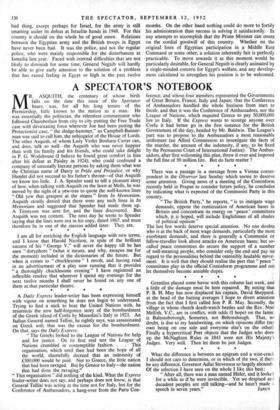A Daily Express leader-writer has been expressing himself with vigour
on something he does not begin to understand. Trying to find a stick to beat the United Nations with, he resurrects the now half-forgotten story of the bombardment of the Greek island of Corfu by Mussolini's Italy in 1923. An Italian General named Tellini, he rightly says, was assassinated on Greek soil; that was the excuse for the bombardment. On that, says the Daily Express, " The Greeks looked to the League of Nations for help and for justice. On its first real test the League of Nations crumbled in contemptible fashion. . . . This organisation, which until then had been the hope of all the world, shamefully decreed that an indemnity of £500,000 would be paid. Not to Greece, the little nation that had been ravaged. But by Greece to Italy—the nation that had done the ravaging."
" This organisation " did nothing of the kind. What the Express leader-writer does not say, and perhaps does not know, is that General Tellini was acting at the time not for Italy, but for the Conference of Ambassadors, a hang-over from the Paris Con- ference, and whose four members represented the Governments of Great Britain, France, Italy and Japan; that the Conference of Ambassadors handled the whole business from start to finish; and that it was the Conference of Ambassadors, not the League of Nations, which required Greece to pay 50,000,000 lire to Italy. If the Express wants to scourge anyone over Corfu it had better go in the first instance for the British Government of the day,.headed by Mr. Baldwin. The League's part was to propose to the Ambassadors a most reasonable settlement (an Allied Commission to investigate the facts of the murder, the amount of the indemnity, if any, to :be fixed by the Permanent Court of International Justice). The Ambas- sadors, after first welcoming this plan, threw it over and imposed the full fine of 50 million lire. But do facts matter ?


































 Previous page
Previous page